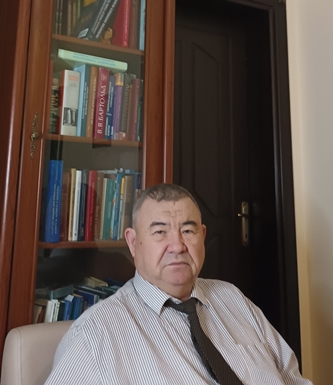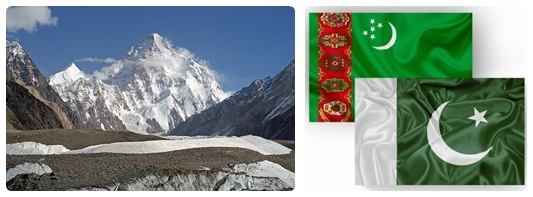Begench Karaev
Muhammad Iqbal:
Himalayas
… About the Himalayas, tell us without embellishment,
How our ancestors found a home near you,
How noble, unsophisticated they were – the story
About the purity of the original, start now.
Imagination, penetrate the origins of events,
Days of our lives, run back, back!
May 9, 2022 marks thirty years since the establishment of diplomatic relations between the two fraternal states – Turkmenistan and the Islamic Republic of Pakistan. A historic event – the solemn signing of the Joint Protocol on the establishment of diplomatic relations took place on a warm May day in 1992 in Ashgabat during the visit of the government delegation of Pakistan to Turkmenistan.
The President of Turkmenistan Serdar Berdimuhamedov in his congratulations expressed his best wishes to the President of the Islamic Republic of Pakistan Arif Alvi, the Prime Minister of the Islamic Republic of Pakistan Mian Muhammad Shahbaz Sharif and all the people of the country on the occasion of the 30th anniversary of the establishment of diplomatic relations between the countries.
“Relations between our states are based on mutual respect, equality and mutual trust,” the head of state noted, emphasizing that Turkmenistan is interested in expanding bilateral ties, and also expressed confidence that, thanks to joint efforts, cooperation between countries will continue to develop in the interests of both peoples.
Thanking the President of Turkmenistan for the congratulatory letter in honor of the 30th anniversary of the establishment of bilateral diplomatic relations, the head of Pakistan Arif Alvi and Prime Minister Muhammad Shahbaz Sharif also congratulated him on this significant date. “Pakistan highly appreciates the good relations established with Turkmenistan, which are based on the principles of mutual trust and consideration of each other’s interests. Our interaction is relevant in the context of promoting energy partnership and economic cooperation between South and Central Asia, which will contribute to the development and prosperity of the entire region,” the Pakistani leader said in his letter.
News agencies of the two countries, as well as regional and world news sources, widely disseminated information about this momentous event.
Paying tribute to the protocol traditions of round anniversaries, but without detracting from the truth, we can say that the past three decades have included centuries-old achievements in the matter of mutual rapprochement between the two countries and their peoples, which have much in common in historical roots dating back to the depths of millennia. .
At the same time, it should be noted that each of our peoples has gone through its own thorny path, measured by centuries, in order to gain their freedom and independence. In particular, the outstanding son of the Pakistani people, the poet and called the “philosopher of the East” Allama Muhammad Iqbal, in one of his early poems “Morning Sun” wrote:
Freedom on earth has not yet been born,
The connection with evil and darkness has not yet been broken,
And you shine equally for everyone from above …
Oh, if I could look at the world like you do,
To penetrate the grief of all people with a clear look.
So as not to distinguish them by race and rites …
… I so want to find the light of truth and goodness,—
The road of search is beautiful and wise!
How much beauty in the search for such
In fruitless, perhaps, human efforts!
You are unfamiliar with the knowledge of sweet awe,
Do not torment you creations of riddles.
(translated by S. Lipkin)
About a century and a half before the appearance of these lines, the voice of the great Turkmen poet, outstanding thinker Magtymguly Fragi sounded powerfully and invitingly in his poem “Görülsin indi” (Call):
… We will not shed our blood in vain:
For our families, for our dear home.
Friends, we all die someday, –
The time has come not to fear death.
The enemy rules – and day after day goes,
In the suffering of the family, the family perishes …
And we, the Turkmens, endure this oppression!
Get up brothers, we can’t be humbled!
Fragi now says to the people:
Sword of valor, take care of your homeland,
May our enemies not touch our roses…
Let revenge bubble like a fiery bird.
(Translated by A. Tarkovsky)
The latest chronicle of Turkmen-Pakistani relations is inextricably linked with the history of Turkmenistan gaining independence in 1991. The Islamic Republic of Pakistan was one of the first in the world to recognize the state sovereignty of Turkmenistan.
The birth of Pakistan itself as an independent state took place in the period after the Second World War, as a result of which the fascist hydra was scattered to dust. But it soon turned out that the threat of a world war was embodied in the peculiar outlines of the Gorgon Medusa, but with nuclear warheads and hanging over all of humanity. Such a comparison is not accidental, because soon after the fall of Berlin, a half-century existential confrontation at the planetary level, known as the Cold War, began between the former allies – called the “winning states, founders of the UN”. When I mention the Gorgon, I deliberately avoid the name of Perseus, since there was no winner in the Cold War, although to this day, somewhere, toasts are raised in the spirit of “Victoribus gloria!” (Glory to the winners!).
I would like today’s candidates for “future winners” to always look into a kind of mirror with which Perseus finished off the Gorgon. Such a mirror, undoubtedly, is the mirror of history, where the real sons of Adam, along with their own face, could see the terrible face of the modern Gorgon. In the context of the above, 1991 went down in history as the year of the collapse of the USSR, the leader of the Eastern Bloc, which opposed the Western Bloc led by the United States during the Cold War.
Analyzing the history of the Cold War and the collapse of the Soviet Union, most experts tend to believe that one of the decisive factors in this confrontation was the invasion of the so-called limited contingent of troops into Afghanistan in December 1979. Unfortunately, this military operation was subsequently not limited either in time or in terms of contingent and was called the “Afghan war” of the twentieth century. The so-called “graveyard of empires”, where soldiers’ skeletons from the time of Alexander the Great lie deep under the scorched soil, once again justified its name. The fate of foreign invaders can be characterized by some proverbs of the Afghan people, such as “A man ate porridge, but choked on a bone” or “On his street, even a dog fights like a lion.” The homeland of the founder of the Afghan state, Ahmad Shah Durrani, over the past centuries has proved the truth of the meaning of such catchphrases. The events of mid-August 2021 already in the new millennium showed the paradoxicality of someone else’s imperial control of this ancient land. Here you can cite another Afghan proverb: “Fire is not a drum, but if you step on it, you will dance.”
It must be recognized that, unlike the conclusions of some of today’s scientists and experts, the experience and knowledge of those people who were directly involved in the dramatic events of the second half of the last century are invaluable. One of such respected veterans and professionals is Ambassador Berdyniyazov Sapar Komekovich, who during the Soviet period worked in the diplomatic missions of the USSR in Pakistan and Afghanistan, and then as the Ambassador Extraordinary and Plenipotentiary of independent and sovereign Turkmenistan in Islamabad for 17 years.
If you follow the lines of his official biography, then S. Berdyniyazov in the period 1977-1984 worked at the USSR Consulate in Karachi. In 1985-1989 worked as a secretary of the USSR Embassy in the capital of Afghanistan, Kabul. before his appointment on January 6, 1995 as Ambassador Extraordinary and Plenipotentiary of Turkmenistan to the Islamic Republic of Pakistan, and worked in the system of the Ministry of Foreign Affairs of Turkmenistan in senior positions. From 2012 to 2019, he worked as Ambassador-at-Large of the Ministry of Foreign Affairs of Turkmenistan. Currently, he continues to work in the system of the diplomatic service, teaching at the IIR (Institute of International Relations) of the Ministry of Foreign Affairs of Turkmenistan.
During his stay in Pakistan and Afghanistan for almost a quarter of a century, the veteran of the diplomatic service S. Berdyniyazov witnessed the dramatic development of events in South Asia and the Middle East, as well as the sharp confrontation between the USSR and the USA during the Cold War, armed conflicts and civil confrontation as well as launching a resolute struggle by the international community against extremism and terrorism.
To be continued…

About the author: Begench Saparovich Karaev, defended his doctorate in philosophy in April 1996 in Moscow, published several monographs and dozens of articles on the theory and methodology of political analysis, including in relation to the conditions of the traditional Central Asian society. Starting from 1997, over the next almost a decade and a half, he headed the information and analytical structure of the Foreign Ministry of Turkmenistan. From April 2004 to February 2005, he conducted research and lectures at Indiana University Bloomington (Indiana University Bloomington) as part of the targeted program, Fulbright for Visiting Scholars (USA). Currently, he is a senior lecturer at the IIR of the Ministry of Foreign Affairs of Turkmenistan. ///nCa, 22 December 2022
